人教新课标高中英语必修四Unit2Workingtheland教案
- 格式:pdf
- 大小:40.29 KB
- 文档页数:7
![[高中英语]人教新课标英语必修四Unit 2 Working the land教案](https://uimg.taocdn.com/d2429c2eddccda38376bafb5.webp)
Unit2 Working the landVocabulary and Useful ExpressionsStep1.重点难点1. In many ways, he is one of them, and he struggled for the past five decades to help them.In a way; in one way; in some ways 在某种程度上2.However, he cares little about spending the money on himself or leading a comfortable life.care v. 在乎,在意,喜欢,有兴趣spend sth. … on … 在某方面花费spend … (in) doing sth. 花费…做某事3.Wishing for nothing, however, costs nothing.wishing for nothing 动名词短语做主语,谓语动词用单数.however是插入语,表示语气的一种转折.4.It also refers to crops growing with natural rather than chemical fertilizers.refer to 与…有关,关系到某人、某事;提到,涉及;参考5.Instead, organic farmers insist on changing crops every two or three years.insist on 坚持要求;insist后面可以跟从句,其中谓语动词常用should + 动词原形构成6.Dr. Yuan awoke from his dream with the hope of producing a kind of rice that could fees more people.with the hope of 带着某种希望7.He used to walk to his fields twice a day, but now he prefers to ride his motorcycle.used to 过去常常(现在已经不是如此)be used to doing 意思是“习惯于”prefer to do (rather than do) 相比之下更喜欢做某事8.But whatever they grow they make sure that what is left in the ground after harvesting becomes a natural fertilizer for the next year’s crop.whatever引导让步状语从句,表示“无论怎样”,相当于no matter what.Eg: Whatever you do, don’t give up.Step 2.功能句型建议(Suggestion & advice)I would rather … I don’t like … because …I’d prefer … because … It’s a great pity that …Should we/I …? It’s better to …If I h ave a choice I’d choose … because … You need to …May I suggest …? Let me suggest … because …Perhaps we should suggest … because … But what/how about …?Step 3. 重点单词及短语单词①hunger n. 饥饿,食欲;v. 渴望得到某事物,某人hunger for/after sth./sb.②struggle vi.stuggle with sb. 与某人争斗,搏斗struggle (against/with sb./sth.)struggle against/with sb./sth. (for sth.) 争斗,拼搏,奋斗,努力③expand vi. (使某事物)变大,增强,伸展,张开expand on sth. 阐述或详述expansion n. 扩大,扩展,膨胀④equip vt.equip sb./sth. (with sth.) 配备,装备equipment n. 设备,装备⑤export vt. 输出;n. 出口业,出口品import vt. 进口⑥circulate vi. vt. 使某物循环,流通,传播;vt. 发侧知告知某人circulation n. 循环,流传,传播⑦confuse vt. 把某人弄糊涂,使为难,打乱confusion n. 混乱,混淆⑧reduce vt. 缩减,减小,降低reduction n. 减少,缩小⑨supply vt. 供给,供应,满足;n. 供应,供给之物⑩exchange vt. 交换,交易;n. 交换,更换,互访,交流exhange sth. with sth.exchangeable adj. 可交换的,可退换的,可兑换的短语rid … of 清除,摆脱be satisfied with = be contented 感到满足,满意的would rather do sth. 宁可做某事refer to 与…有关,关系到某人,某事,提到,参考search for 寻找,搜寻thanks to 多亏,由于rather than 而不,宁愿…而不Unit2 Working the landWarming Up, Pre-reading and Reading Period 1 Warming up and pre-reading.Step 1 Lead-in.Poem By Li ShenFarmers weeding at noon,Sweat down the field soon.Who knows food on a tray,Due to their toiling day.Then let one student recite the poem in Chinese.Step 2 Warming up by questioningHello, everyone. We shall read about man who works the land today. Have you ever grown any plants? If not, what kind of plant would you like to grow? How will you grow it?(For reference: Mr. Li, I worked with my father in the rice field last year. We grow hybrid rice and use animal wastes to make the soil rich.)Has anyone of you ever been to the countryside? What did you do there?(For reference: I went to Chuankou the day before yesterday. It is a small mountain village 75 li north of Beijing. I went there to visit my uncle’s family. I like that small beautiful village ve ry much. )Who are from a farmer’s family? What do you know about farming?Step 3 Pre-reading and talkingQuestioning and answeringRice is main food in South China. What do you think would happen if tomorrow there was suddenly no rice to eat?(For reference: Then the south people would have to change their eating habit. They could turn to potatoes, wheat flour, cow and sheep cheese, cabbage, onions and garlic for food. They are the bases of the traditional food in North China. )If you had the chance to do one thing to help end hunger in the world, what would you do?(For reference: I would try to end hunger by popularizing the advanced farming techniques.Modern techniques could be introduced to increase the rice output, and expand the area of fields.)Giving background information about Professor Yuan LongpingHave you ever heard of a man called Professor Yuan Longping? Would anyone of you tell the class something about him?(For reference: Professor Y uan Longping is a Chinese agricultural scientist. Professor Yuan's breakthrough scientific achievement led to the world's first successful and widely grown hybrid rice varieties, revolutionizing rice cultivation in China and tripling production over a generation. His approach to rice breeding then spread internationally throughout Asia and to Africa and the Americas, providing food for tens of millions and leading to his becoming known as the "Father of Hybrid Rice."Step 4. ReadingReading aloud to the recordingComprehension—understanding what you are reading—is important. To read in thought groups is an easy, yet effective, way of improving reading comprehension. Now turn to page 9 and read aloud to the recording of the text A PIONEER FOR ALL PEOPLE. Pay attention to the thought groups in the sentences while listening and reading aloud.A brief introduction:Yuan Longping is known as China’s “father of hybrid rice”. It’s said that in China, we eat depending on “Two Ping” ---- Deng Xiaoping, who made the policy of System of Production Responsibility, & Yuan Longping, who invented hybrid rice.Yuan Longping, who was born in September, 1930, graduated from Agriculture Department in Southwest Agricultural Institute. He has been working on agriculture education & the research into hybrid rice since he left the institute.In the 1960s, when China was suffering from serious famine, he came up with the idea of hybrid rice, which has a high yield ( or output). Ten years later, he succeeded in inventing a new species that produced a 20 percent higher yield than common types of rice.Yuan devoted himself to the research into agriculture, & was honored by UNESCO & FAO(联合国教科文组织). Although he is 74 years old, he is still working on the research into agriculture.Period 2 ReadingStep 1 Lead-in.. Listen to the tape carefully then answer these questions.1)When and who did become the first agricultural pioneer in the world to grow rice that has a high output?2)What did Yuan Longping invent?Step2. Read the passage once again,then find out these sentences true or false.1)Dr Yuan is more a farmer than a scientist.2 )Dr Yuan’s kind of rice is the most suitable for China’s farmland.3)Dr Yuan would rather work than relax.4 )Dr Yuan has dreams when he is asleep and also when he is awake.5 )Dr Yuan enjoys a simpler life than most rich and famous people.Step3. Find out the topic sentences of each paragraphPara. 1: He became the first agricultural pioneer in the world to grow rice that has a high output.Para.2:He has devoted his life to finding ways to grow more and more rice..Para.3:He cares little about spending the money on himself and would rather keep time for his hobbies.Para.4 Dr. Yuan’s dreams.Step4. Write down Yuan Longping’s personal informationIn pairs, read the text, find information to complete the following form.Step 5 Language points:1. Struggle for…为争取……而斗争Struggle against…为反对……而斗争Struggle with… 与……争斗1)The swimmer struggled against the tide.2)We had to struggle with/against all kinds of difficulties.3)The slaves struggled for the freedom2. 使做…成为… make +it +adj./n. +to do好天气使游泳成为可能The fine weather makes it possible( for us )to swim.他将每早跑步做为一个规则He makes it a rule to run every morning.其他可用这种结构的词:feel, find, think, consider…3.搜查,搜索search (sb. / sth.) for …He searched all the rooms for the missing person.They searched the man all over for money.4.由于,多亏thanks to 相当于because of5.是从前两倍那么多twice as large as before相当于once larger than before6.对……感到满意be satisfied with…相当于be pleased withadj. satisfactory/satisfyingn. satisfaction7.在乎,在意care about比较care forMy aunt cared for me when my parents were away last week.Dr Yuan never cares about money and fame.8. Indeed, his sunburn face and arms and his slim, strong body are like those of millions of other Chinese farmers.e.g: The streets in Beijing are wider than those in my hometown.The number of students in our school is larger than that in their school.9. Dr Yuan grows what is called super hybrid rice.e.g: He came to what is called America.10. This special strain of rice makes it possible to produce one -third more of the crop in the same fields.e.g: That made it possible for life to begin to develop.The development of science makes it possible for us to know more about the universe.11. Dr Yuan awoke from his dream with the hope of producing a kind of rice (that could feed more people).e.g: He went to the U.S with the hope of finding a better job there.Step 6Closing down by having a dictationTo end the peri od you will take a dictation. It is about Yuan Longping, “Father of Super hybrid rice”.Yuan Longping, China's Most Famous "Farmer"Yuan came up with the idea of hybridizing rice for the first time in the world in 1960s. Since then, 50 percent of China's total rice cultivation fields have grown such rice, which added some 300 billion kilograms to the country's grain output. Furrows grown on his sunburnt face, a slim figure and coiled-up trousers legs would confuse foreign reporters who came to interview themost famous scientist in China, who would rather be called “a farmer”. Indeed, like many Chinese farmers, Yuan in his 70s and has devoted most of his life growing rice in paddy fields, but unlike those farmers, he reaps the seed from experimental fields only for hybridizing rice.Unit2 Working the landListening, Speaking and WritingLearning AimsTo help students read the passage Organic Farming.To help students to use the language by reading, listening, speaking and writing.ProceduresI.Warming up by listening and reading aloudLanguage is created to be listened to and spoken first. So open your book to page 13 and read it aloud while listening to the recording. Watch your pauses between the thought groups.II. Guided reading1.Reading and translatingRead the text sentence by sentence, and put it into Chinese. Who will be the first to try. I will only have four of you to do this task..Reading and underliningNext you are to read and underline all the useful expressions or collocations in the passage. Copy them to your notebook after class as homework.2.Doing exercisesNow you are going to do exercises No. 1, 2 and 3 on page 14 following the article.3.ListeningFor listening turn to page 14 and then 15 for the listening exercises 1, 2 and 3. Are you ready?5. Reading, speaking and writingWhen trying to argue people into or out of doing something we may use the following expressions:In pairs you are to make up a dialogue to argue each other into or out adopting organic farming. I will argue with your monitor, Liang Bochao. Get started.III. Guided writing1.Writing a posterWriting a poster which includes all the information about the uses of computer so that you will encourage more farmers to buy and use. You are asked to base your poster on the overall pattern of the article you learned Organic Farming. Limit your poster to between 200 and 250 words.2.Writing a speechWrite a speech for Professor Yuan Longping. He is to attend an international conference on modern agriculture. You may also make use of the library and network resources for the task. IV. Further applyingFinding informationRead online to find as much information as possible about Professor Y uan Longping and his research group. Share your findings with you partner next time you are here.Writing a reportGo back home to interview your parents or your grandparents about China’s agriculture, its past and present situations. Write a report in English in about 500 words as a weekly project.Acting a text playTurn either one of the two articles into a text play. Rehearse it and play it in front of the class. The play shall last at least 10 minutes.IV. Closing downClosing down by filling a formTo end the period, please fill in the form below.Closing down by imagingImagine and write about what the agriculture will be like 50 years from now in the future. Use your imagination to compete for “wild thinking prize”.Unit2 Working the landGrammar and Useful StructuresLearning AimsTo help students learn about The –ing form as the Subject & Object.To help students discover and learn to use some useful words and expressions.To help students discover and learn to use some useful structures.ProceduresI. Warming upWarming up reading aloud the text A PIONEER FOR ALL PEOPLELanguage is learned in context. So let’s first review the text learne d yesterday by reading it aloud. Try to force out your English slowly and clearly.II. Discovering useful words and expressionsIn pairs do the exercises 1, 2 and 3 . You must finish them in 5 minutes.III. Learning about grammar1. Read and identifyRead the text about Yuan Longping again, paying attention to the sentences which use the –ing form as the subject and object.In the sentence “Wishing for things, however, cost nothing. “the –ing is used as subject.It can be also used as object of the sentence. For example: Yuan Longping likes playing his violin.2. Consolidating by do exercisesTo consolidate your understanding you will be given 10 minutes to go over exercises 1,2,3,4 and 5 on pages 12 and 13. You may just write on your text book. I mean the student’s book you are working by.III. Ready used materials for The –ing form as the Subject & Object)语法学习——动名词1. 动名词作主语1)名词直接放在句首作主语.例如:Using the right hand to shake hands is a convention in many countries.用右手握手是许多国家的一种习俗.2)动名词在“It is no use/ no good/ fun / a waste of time/ a good pleasure 等名词+ doing”结构中作主语,it为形式主语.例如:It is no good writing to him; he never answers letters.写信给他不妥,他从来不回信.It is no use your complaining; the company won’t do anything about it.抱怨是没有用的,公司是不会管的.3)动名词在“I t is useless/ nice/ good/ interesting/ worthwhile 等形容词+ doing”结构中作主语.例如:It is good playing chess after supper.晚饭后弈棋挺好.It is useless speaking.光说是没有用的.4)动名词在“There is(was) no + doing”结构中作主语.例如:There is no denying that she is very efficient.她效率高是不容否认的.There is no telling what he is going to do.他要做什么一点消息都没有.2. 动名词作宾语1)有些动词后面要求跟动名词作宾语.常这样用的动词有:admit 承认;excuse 原谅;postpone 拖延;anticipate 期望;fancy 想象practise 练习;appreciate 欣赏;finish 完成;prevent 防止;avoid 避免;forbid 禁止;propose 建议;consider 考虑;forgive 宽恕;recollect 回忆;delay 耽搁;imagine 想象;resent 厌恶;deny 否认;involve 涉及;resist 抵制;detest 厌恶;keep 保留;risk 冒险;dislike 讨厌;mind 在意;save 挽救;dread 害怕;miss 错过;suggest 建议;enjoy 喜欢;pardon 原谅;understand 理解;escape 逃避;permit 允许例如:I recommend buying the dictionary.我建议买这本词典.I don’t anticipate meeting any opposition.我估计不会遇到任何反对意见.Will you admit having broken the window?你承认不承认打破了窗户?2)有些动词短语后也要求跟动名词作宾语.常这样用的动词短语有:can’t stand 忍不住;can’t help 忍不住;feel like 想,欲;give up 放弃;put off 推迟例如:He put off making a decision till he had more information.在获得详情之前,他没有急于做出决定.Do you feel like taking a walk?你要不要去散步?3)动名词常跟在介词或介词短语后做宾语.常这样用的介词短语有:instead of, look forwardto, object to, keep on, see about, take to 等.例如:We are looking forward to coming to China.我们期待着来中国.We succeeded in getting over all the difficulties.我们终于克服了所有的困难.4)在“have difficulty (trouble, problem, a hard time, fun, a good time) (+in) + 动名词;be busy (in) + 动名词;waste time (in) + 动名词;lost time (in) + 动名词;There is no point (in) + 动名词”等结构中,动名词做介词宾语,in常要省去.例如:The children are busy doing their homework.孩子们忙于做作业.There is no point (in) making the simple experiments once again.再做一次这种简单的实验是毫无意义的.5)在复合宾语中,用it作形式宾语,将动名词短语放在后面.例如:I consider it a waste of time arguing about it.我认为辩论这事是很浪费时间的.6)在“there be”结构当中,be为动名词时,该结构也是一种带逻辑主语的动名词形式.例如:We can imagine there being a lot of fuss about it.我们可以想象到人们对此大惊小怪.Were you disappointed at there not having been more gifts?你对没有更多的礼物感到失望吗?3. 动名词的被动式1)动词need, require, want, deserve后,用动名词的主动形式表示被动意义.其用法相当于不定式的被动结构.例如:The watch needs repairing. (=The watch needs to be repaired.)这块表需要修理.The problem deserves thinking about. (=The problem deservers to be thought about.)这个问题值得考虑.2)在(be)worth后面只能用动名词的主动态来表示被动意义.例如:His suggestion is worth considering. 他的提议值得考虑.IV. Closing down by doing a quiz。
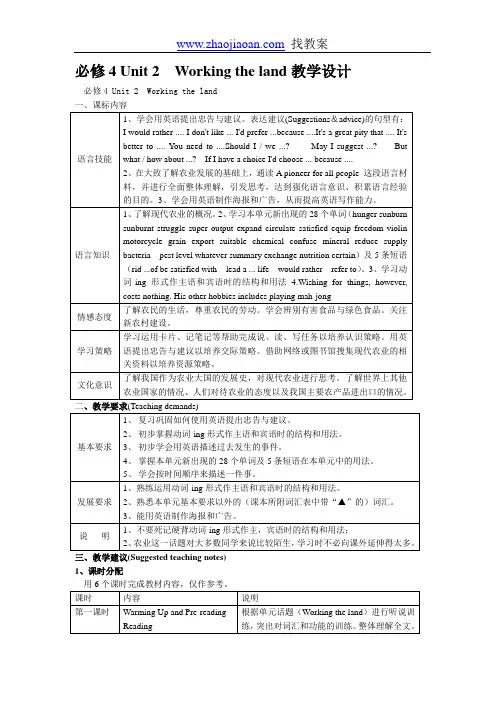
必修4 Unit 2 Working the land教学设计必修4 Unit 2 Working the land一、课标内容二、教学要求(Teaching demands)三、教学建议(Suggested teaching notes)1、课时分配2、教材各部分教学建议本单元的中心话题是“农业”。
“热身”(Warming Up)部分围绕有关农业、农村和农作物种植的内容提问,让学生谈谈对农村和农业劳动的认识或经验。
采用讨论法,在讨论中,教师可充分调动来自农村的学生的讨论积极性,并给予学生一个互相学习和交流的机会。
对于没有这方面知识和体验的学生,教师应鼓励他们利用这一机会进行社会调查,有条件的最好能到农村体验生活,让学生有机会真正了解农村生活,了解中国农民的生活现状,提高他们对农业的认识,使来自城镇的现代农业知识的中学生对农村和农业有一定感性认识。
“读前”(Pre-reading)部分提了两组问题。
第一组问题讨论大米在东亚和东南亚国家的人民基本生活中所处的地位;第二组问题提出了世界上迫切要解决的现象即饥饿。
有关讨论不仅力图激发学生的创造性思维,帮助对课文的理解,为阅读部分的教学做好铺垫。
同时让学生了解世界上还存在极其严重的饥饿问题,培养了学生的同情心和人道主义精神。
“阅读”(Reading)部分介绍中国著名的农业科学家、“水稻之父”袁隆平和他的巨大成就。
第一段通过对袁隆平的外貌描写,刻画出一个普通中国农民的形象。
袁隆平也称他自己是农民,也和农民一起耕种,他的科研殿堂就是广阔的农村。
然后介绍袁隆平的科研成果—超级杂交水稻。
第二段介绍袁隆平的家庭背景、学业和科研情况。
第三段勾勒出袁博士不图名不图利,无私奉献的高尚品质。
教学中我们可以引导学生从不同角度分析袁隆平的工作、成就、生活及人格魅力等,勾画出一个过着普通人的生活,干着伟大的事业人先进人物;塑造了一个朴实、务实的中国农业科学家的形象。
“理解”(Comprehending)部分设计了三个练习。
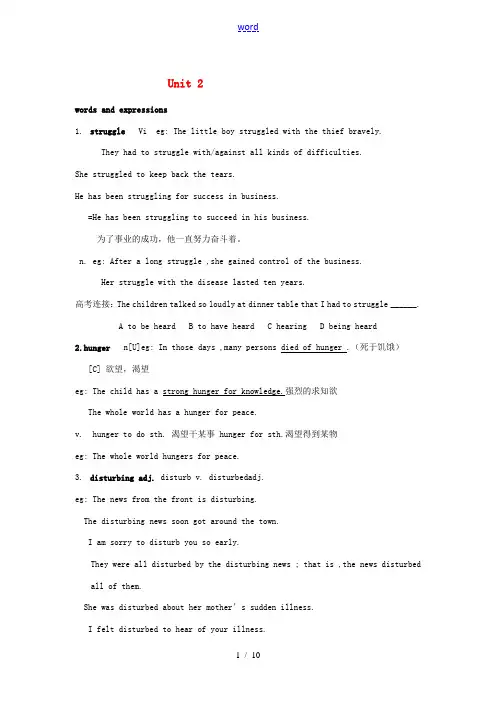
Unit 2words and expressions1.struggle Vi eg: The little boy struggled with the thief bravely.They had to struggle with/against all kinds of difficulties.She struggled to keep back the tears.He has been struggling for success in business.=He has been struggling to succeed in his business.为了事业的成功,他一直努力奋斗着。
n. eg: After a long struggle ,she gained control of the business.Her struggle with the disease lasted ten years.高考连接:The children talked so loudly at dinner table that I had to struggle ______.A to be heardB to have heardC hearingD being heard2.hunger n[U]eg: In those days ,many persons died of hunger .(死于饥饿)[C] 欲望,渴望eg: The child has a strong hunger for knowledge.强烈的求知欲The whole world has a hunger for peace.v. hunger to do sth. 渴望干某事 hunger for sth.渴望得到某物eg: The whole world hungers for peace.3.disturbing adj. disturb v. disturbedadj.eg: The news from the front is disturbing.The disturbing news soon got around the town.I am sorry to disturb you so early.They were all disturbed by the disturbing news ; that is ,the news disturbed all of them.S he was disturbed about her mother’s sudden illness.I felt disturbed to hear of your illness.4.expand eg:The eagle expanded his wings.He is thinking of expanding his business.Metals expand when they are heated .Our foreign trade has expanded greatly in recent years.In ten years ,the city’s population expanded by 10%.搭配expand …. in/into…..把….扩展. expand on/upon 详细阐明Eg: He expanded his short story into a novel.I don’t understand your reasoning. Can you expand on it?5.thanks to eg; Thanks to your timely help, I managed to finish the work on time.It was thanks to his advice that I succeeded.表示“原因”的介词短语还有:due to(一般不放于句首) ; as a result of ,because of ;owing to ; on account of; in that(引导原因状语从句)eg:The accident was due to his careless driving .Owing to your timely help, we finished the work ahead of time.As a result of the bad weather ,the football match was put off.His request is unreasonable in that he knows we can't afford it.We delayed our departure on account of the bad weather.6.rid……of eg:You should rid yourself of the bad habit.We try to rid the house of mice.拓展get/be rid of 摆脱;除掉eg:I can’t get rid of this headache.She was glad to be rid of him.:warn sb. of sth.; inform sb. of sth. ; cure sb. of sth. ; rob sb.of sth.;7.be satisfied with eg:I was satisfied/pleased/content with the result.be satisfied to do 对做某事感到满意eg: He was satisfied to win the race.拓展: Some people are hard to satisfy.(vt)There was a satisfied look on his face.(adj)The answer was quite satisfying /satisfactory to him.(adj.)To our satisfaction, he accepted our invitation.(n.)8 .would rather eg: I would rather play football this afternoon, if you don’t mind.I’d rather not let him know the truth.Would you rather stay here or go home?I would rather stay at home than go out. =I would stay at home rather than go out.would rather 后跟从句时,表示主语宁愿让某人做某事,从句用虚拟语气即用一般过去时表示与现在或将来事实相反;用过去完成时表示与过去事实相反。
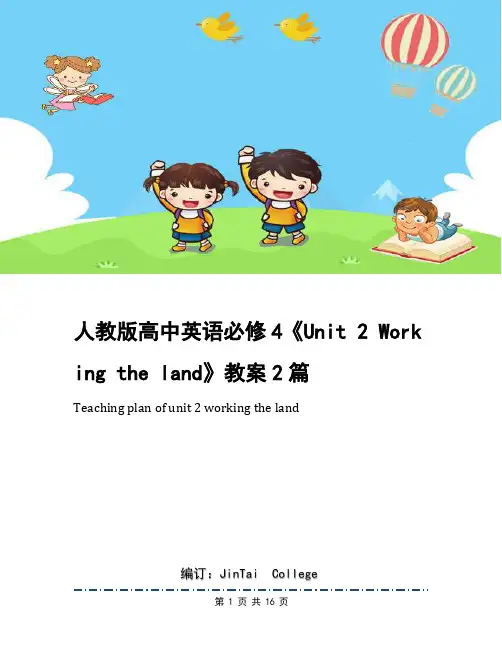
人教版高中英语必修4《Unit 2 Work ing the land》教案2篇Teaching plan of unit 2 working the land编订:JinTai College人教版高中英语必修4《Unit 2 Working the land》教案2篇前言:英语作为在许多国际组织或者会议上都是必需语言,几乎所有学校选择英语作为其主要或唯一的外语必修课。
英语教学涉及多种专业理论知识,包括语言学、第二语言习得、词汇学、句法学、文体学、语料库理论、认知心理学等内容。
本教案根据英语课程标准的要求和教学对象的特点,将教学诸要素有序安排,确定合适的教学方案的设想和计划、并以启迪发展学生智力为根本目的。
便于学习和使用,本文档下载后内容可按需编辑修改及打印。
本文简要目录如下:【下载该文档后使用Word打开,按住键盘Ctrl键且鼠标单击目录内容即可跳转到对应篇章】1、篇章1:人教版高中英语必修4《Unit 2 Working the land》教案2、篇章2:人教版高中英语必修4《Unit 2 Working the land》教案篇章1:人教版高中英语必修4《Unit 2 Working the land》教案教学准备教学目标(1)知识目标:让学生通过阅读课文更多地了解我国著名的农业科学家袁隆平的科研成果及其影响。
(2)能力目标:让学生进一步使用恰当地阅读方式与技能,如略读(skimming),快速阅读(fast reading),细读(close reading)等(3)情感目标:让学生不但学习袁隆平的科研精神,更要学习他不计较名利,踏踏实实的生活态度。
教学重难点1.阅读课文更多地了解我国著名的农业科学家袁隆平的科研成果及其影响。
教学过程1.话题的引导。
(Pre-reading)1).开头通过设计了一首熟悉的诗歌,让学生知道话题---farming.2).涉及到提高产量从而解决世界饥荒问题,从而引出本节课的中心话题--伟大人物袁隆平。
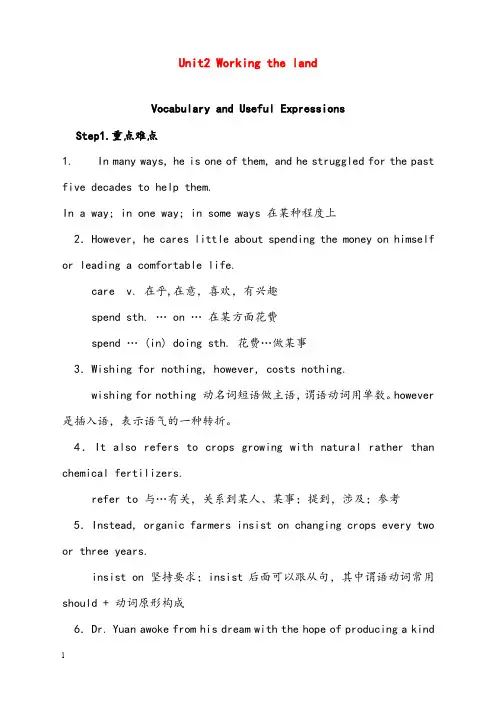
Unit2 Working the landVocabulary and Useful ExpressionsStep1.重点难点1. In many ways, he is one of them, and he struggled for the past five decades to help them.In a way; in one way; in some ways 在某种程度上2.However, he cares little about spending the money on himself or leading a comfortable life.care v. 在乎,在意,喜欢,有兴趣spend sth. … on …在某方面花费spend … (in) doing sth. 花费…做某事3.Wishing for nothing, however, costs nothing.wishing for nothing 动名词短语做主语,谓语动词用单数。
however 是插入语,表示语气的一种转折。
4.It also refers to crops growing with natural rather than chemical fertilizers.refer to 与…有关,关系到某人、某事;提到,涉及;参考5.Instead, organic farmers insist on changing crops every two or three years.insist on 坚持要求;insist后面可以跟从句,其中谓语动词常用should + 动词原形构成6.Dr. Yuan awoke from his dream with the hope of producing a kindof rice that could fees more people.with the hope of 带着某种希望7.He used to walk to his fields twice a day, but now he prefers to ride his motorcycle.used to 过去常常(现在已经不是如此)be used to doing 意思是“习惯于”prefer to do (rather than do) 相比之下更喜欢做某事8.But whatever they grow they make sure that what is left in the ground after harvesting becomes a natural fertilizer for the next year’s crop.whatever引导让步状语从句,表示“无论怎样”,相当于no matter what. Eg: Whatever you do, don’t give up.Step 2.功能句型建议(Suggestion & advice)I would rather … I don’t like … because …I’d prefer … because … It’s a great pity that …Should we/I …? It’s better to …If I have a choice I’d choose … because … You need to …May I suggest …? Let me suggest … because …Perhaps we should suggest … because … But what/how about …?Step 3. 重点单词及短语单词① hunger n. 饥饿,食欲;v. 渴望得到某事物,某人hunger for/after sth./sb.② struggle vi.stuggle with sb. 与某人争斗,搏斗struggle (against/with sb./sth.)struggle against/with sb./sth. (for sth.) 争斗,拼搏,奋斗,努力③ expand vi. (使某事物)变大,增强,伸展,张开expand on sth. 阐述或详述expansion n. 扩大,扩展,膨胀④ equip vt.equip sb./sth. (with sth.) 配备,装备equipment n. 设备,装备⑤ export vt. 输出;n. 出口业,出口品import vt. 进口⑥ circulate vi. vt. 使某物循环,流通,传播;vt. 发侧知告知某人 circulation n. 循环,流传,传播⑦ confuse vt. 把某人弄糊涂,使为难,打乱confusion n. 混乱,混淆⑧ reduce vt. 缩减,减小,降低reduction n. 减少,缩小⑨ supply vt. 供给,供应,满足;n. 供应,供给之物⑩ exchange vt. 交换,交易;n. 交换,更换,互访,交流 exhange sth. with sth.exchangeable adj. 可交换的,可退换的,可兑换的短语rid … of 清除,摆脱be satisfied with = be contented 感到满足,满意的would rather do sth. 宁可做某事refer to 与…有关,关系到某人,某事,提到,参考search for 寻找,搜寻thanks to 多亏,由于rather than 而不,宁愿…而不Unit2 Working the landWarming Up, Pre-reading and Reading Period 1 Warming up and pre-reading.Step 1 Lead-in.Poem By Li ShenFarmers weeding at noon,Sweat down the field soon. Who knows food on a tray,Due to their toiling day.Then let one student recite the poem in Chinese.Step 2 Warming up by questioningHello, everyone. We shall read about man who works the land today. Have you ever grown any plants? If not, what kind of plant would you like to grow? How will you grow it?(For reference: Mr. Li, I worked with my father in the rice field last year. We grow hybrid rice and use animal wastes to make the soil rich.)Has anyone of you ever been to the countryside? What did you do there? (For reference: I went to Chuankou the day before yesterday. It is a small mountain village 75 li north of Beijing. I went there to visit my uncle’s family. I like that small beautiful village very much. )Who are from a farmer’s family? What do you know about farming? Step 3 Pre-reading and talkingQuestioning and answeringRice is main food in South China. What do you think would happen if tomorrow there was suddenly no rice to eat?(For reference: Then the south people would have to change their eating habit. They could turn to potatoes, wheat flour, cow and sheep cheese, cabbage, onions and garlic for food. They are the bases ofthe traditional food in North China. )If you had the chance to do one thing to help end hunger in the world, what would you do?(For reference: I would try to end hunger by popularizing the advanced farming techniques. Modern techniques could be introduced to increase the rice output, and expand the area of fields.)Giving background information about Professor Yuan Longping Have you ever heard of a man called Professor Yuan Longping? Would anyone of you tell the class something about him?(For reference: Professor Yuan Longping is a Chinese agricultural scientist. Professor Yuan's breakthrough scientific achievement led to the world's first successful and widely grown hybrid rice varieties, revolutionizing rice cultivation in China and tripling production over a generation. His approach to rice breeding then spread internationally throughout Asia and to Africa and the Americas, providing food for tens of millions and leading to his becoming known as the "Father of Hybrid Rice."Step 4. ReadingReading aloud to the recordingComprehension—understanding what you are reading—is important. To read in thought groups is an easy, yet effective, way of improving reading comprehension. Now turn to page 9 and read aloud to therecording of the text A PIONEER FOR ALL PEOPLE. Pay attention to the thought groups in the sentences while listening and reading aloud.A brief introduction:Yuan Longping is known as China’s “father of hybrid rice”. It’s said that in China, we eat depending on “Two Ping” ---- Deng Xiaoping, who made the policy of System of Production Responsibility, & Yuan Longping, who invented hybrid rice.Yuan Longping, who was born in September, 1930, graduated from Agriculture Department in Southwest Agricultural Institute. He has been working on agriculture education & the research into hybrid rice since he left the institute.In the 1960s, when China was suffering from serious famine, he came up with the idea of hybrid rice, which has a high yield ( or output). Ten years later, he succeeded in inventing a new species that produced a 20 percent higher yield than common types of rice. Yuan devoted himself to the research into agriculture, & was honored by UNESCO & FAO(联合国教科文组织). Although he is 74 years old, he is still working on the research into agriculture.Period 2 ReadingStep 1 Lead-in。

新人教必修4教案 Unit2 Working the land[全套教案]Unit 2 Working the landTeaching aims:1. Target Languagea.Words and phrasessunburn, struggle, super, expand, circulate, equip, export, rid ... of, be satisfied with, lead a ... life, search for, would rather, thanks to, with the hope of, rather thanb. Important sentencesThis special strain of rice makes it possible to produce one-third more of the crop in the same fields. P10He cares little about spending the money on himself or leading a comfortable life. P10 2. Ability goalsEnable Ss to learn more about agriculture, countryside and farming. By talking they can exchange their experience with each other. By reading they will realize the role that agriculture plays in human life. In fact this world faces a serious problem—starvation. So after reading the passage about Dr Yuan students will know the importance of his achievement to man. Of course they will learn from Dr Yuan some noble character.3. Learning ability goalsHelp Ss learn how to describe Dr Yuan Longping including his personality.Teaching important pointsa. Help to comprehend the text and grasp the main idea of the text.b. Grasp the usage of some words and expressions.c. How to help students make up their minds to make contributions to motherland in the future like Dr Yuan.Teaching difficult pointsa. How to help students learn more about agriculture.b. Help students really master the usage of words and expressions.Teaching methodsTalking, questioning-and-answering activity and reading.Teaching aidsA tape recorder, a projector and a computer.Teaching procedures & waysThe first period ReadingStep 1.Greeting and Revision1. Greet the students as normal.2. Revise the warming up with the following questionHow do you think to grow our main food--rice?-----1)First, the farmers plow the field. They have to make the soil loose enough to plant crops.2)Second,grow some young plants3)Third, they insert the young plants into the loose field.4)At last ,they will get the harvestStep 2 Pre-reading1 Ask the following questions1).What’s the main food in Canada and USA:----- potatoes and bread2).What is the main food in South America:----- corn/maize3 )What is the main food in Southeast Asian countries:----- rice2 Show the students some pictures and ask the questionWhat is happening to these people in East Asian and Southeast Asian countries?Then show more news like that:International Facts on Hunger and Poverty (2002)1)Every 8 seconds, a child somewhere in the world dies from starvation.2)More than 800 million people in the world suffer from malnutrition (营养不良)---799 million of them are from the developing world. More than 153 million of them are underthe age of 5.At last ask the students to discuss:If you had the chance to do something to help end hunger in the world, what would you do?Encourage the students to tell their opinions, Then give a conclusion:The only way to solve the food shortage problem is to increase the output of the grain crop per land area through the advancement of science and technology.3. lead the students to pay attention to the people---Yuan LongpingAsk : What do you know about him?--------Father of Hybrid RiceThen lead to the topic of the reading passage. A Pioneer For All PeopleStep 3 ListeningListen to the tape, try to find out some information of the hero.Name ____________Age ____________Job _____________Education _________Achievement _______Hobbies __________Step 4 Fast readingRead the passage quickly and answer the true-or- false questions• 1.Dr Yuan is more a farmer than a scientist.•2. Dr Yuan’s kind of rice is the most suitable for China’s farmland.• 3.Dr Yuan would rather work than relax.• 4. Dr Yuan has dreams when he is asleep and also when he is awake.• 5. Dr Yuan enjoys a simple life than most rich and famous people.Step 5 Careful readingRead each paragraph and answer the following questions:Para 1:1.What dose Dr. Yuan look like? Why?2.What is his achievement?Para 2:1. Why did Dr. Yuan want to increase the rice output when he was young?2.How does he help rid the world of hunger?Para 3.41. What kind of life is Dr. Yuan leading?2.What is Dr Yuan’s dream?Step 6 Skimming:find out the main idea of each paragraph.Paragraph------Main Idea1----------His appearance and achievements2----------His birth, education and research3----------His personality4----------His dreamStep 7 Homework1.Learn the poemThe Peasants’ LotLi Shen (772-846)Farmers weeding at noon,Sweat down the field soon.Who knows food on a tray,Due to their toiling day?2. Finish the exercises in Learning about Language.3. Retell the text in about 150 words.Notes:a. Use the first person to retell the story.b. Try to use the proper conjunctions.The second period Learning about Language(The –ing form as the Subject & Object)AimsTo help students learn about The –ing form as the Subject & Object.To help students discover and learn to use some useful words and expressions.To help students discover and learn to use some useful structures.ProceduresI. Warming upWarming up reading aloud the text A PIONEER FOR ALL PEOPLELanguage is learned in context. So let’s first review the text learned yesterday by reading it aloud. Try to force out your English slowly and clearly.II. Discovering useful words and expressionsIn pairs do the exercises 1, 2 and 3 on pages 11 and 12. You must finish them in 5 minutes.III. Learning about grammar1. Read and identifyRead the text about Yuan Longping again, paying attention to the sentences which use the –ing form as the subject and object.In the sentence “Wishing for things, however, cost nothing. “the –ing is used as subject. It can be also used as object of the sentence. For example: Yuan Longping likes playing his violin.2. Consolidating by do exercisesTo consolidate your understanding you will be given 10 minutes to go over exercises 1,2,3,4 and 5 on pages 12 and 13. You may just write on your text book. I mean the student’s book you are working by.III. Ready used materials for The –ing form as the Subject & Object)语法学习——动名词1. 动名词作主语1)名词直接放在句首作主语。
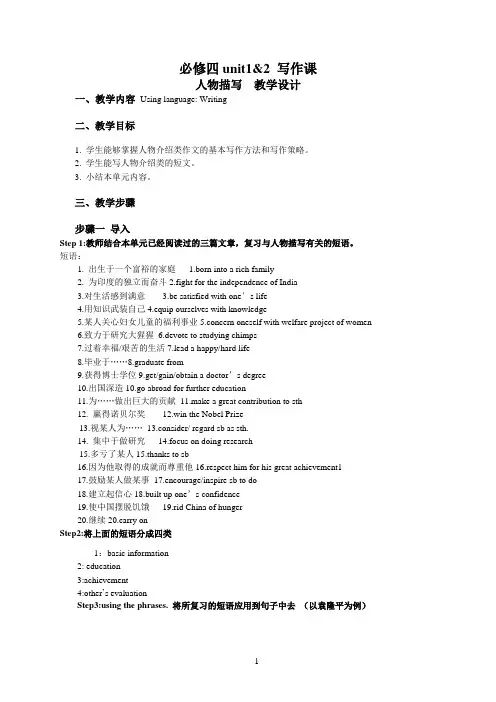
必修四unit1&2 写作课人物描写教学设计一、教学内容Using language: Writing二、教学目标1.学生能够掌握人物介绍类作文的基本写作方法和写作策略。
2. 学生能写人物介绍类的短文。
3.小结本单元内容。
三、教学步骤步骤一导入Step 1:教师结合本单元已经阅读过的三篇文章,复习与人物描写有关的短语。
短语:1. 出生于一个富裕的家庭 1.born into a rich family2. 为印度的独立而奋斗2.fight for the independence of India3.对生活感到满意 3.be satisfied with one’s life4.用知识武装自己4.equip ourselves with knowledge5.某人关心妇女儿童的福利事业5.concern oneself with welfare project of women6.致力于研究大猩猩6.devote to studying chimps7.过着幸福/艰苦的生活7.lead a happy/hard life8.毕业于……8.graduate from9.获得博士学位9.get/gain/obtain a doctor’s degree10.出国深造10.go abroad for further education11.为……做出巨大的贡献11.make a great contribution to sth12. 赢得诺贝尔奖12.win the Nobel Prize13.视某人为……13.consider/ regard sb as sth.14. 集中于做研究14.focus on doing research15.多亏了某人15.thanks to sb16.因为他取得的成就而尊重他16.respect him for his great achievement117.鼓励某人做某事17.encourage/inspire sb to do18.建立起信心18.built up one’s confidence19.使中国摆脱饥饿19.rid China of hunger20.继续20.carry onStep2:将上面的短语分成四类1:basic information2: education3:achievement4:other’s evaluationStep3:using the phrases. 将所复习的短语应用到句子中去(以袁隆平为例).Step4: 归纳写作句型1:Born in/on…, XXX, 身份,+ V. +…2:After graduating from…, XXX +V.+ ….3:It is…that…Step5:using the phrases 2.以李娜为例,给学生三分钟的时间,根据中文提示用五个句子描写李娜,用上刚刚复习的短语及学习的句型。
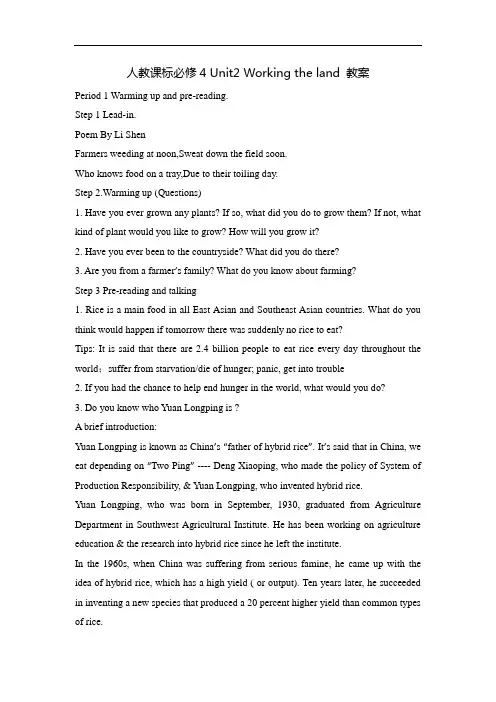
人教课标必修4 Unit2 Working the land 教案Period 1 Warming up and pre-reading.Step 1 Lead-in.Poem By Li ShenFarmers weeding at noon,Sweat down the field soon.Who knows food on a tray,Due to their toiling day.Step 2.Warming up (Questions)1. Have you ever grown any plants? If so, what did you do to grow them? If not, what kind of plant would you like to grow? How will you grow it?2. Have you ever been to the countryside? What did you do there?3. Are you from a farmer’s family? What do you know about farming?Step 3 Pre-reading and talking1. Rice is a main food in all East Asian and Southeast Asian countries. What do you think would happen if tomorrow there was suddenly no rice to eat?Tips: It is said that there are 2.4 billion people to eat rice every day throughout the world;suffer from starvation/die of hunger; panic, get into trouble2. If you had the chance to help end hunger in the world, what would you do?3. Do you know who Yuan Longping is ?A brief introduction:Yuan Longping is known as China’s “father of hybrid rice”. It’s said that in China, we eat depending on “Two Ping” ---- Deng Xiaoping, who made the policy of System of Production Responsibility, & Yuan Longping, who invented hybrid rice.Yuan Longping, who was born in September, 1930, graduated from Agriculture Department in Southwest Agricultural Institute. He has been working on agriculture education & the research into hybrid rice since he left the institute.In the 1960s, when China was suffering from serious famine, he came up with the idea of hybrid rice, which has a high yield ( or output). Ten years later, he succeeded in inventing a new species that produced a 20 percent higher yield than common types of rice.Yuan devoted himself to the research into agriculture, & was honored by UNESCO & FAO(联合国教科文组织). Although he is 74 years old, he is still working on the research into agriculture.Period 2 ReadingStep 1 Lead-in。
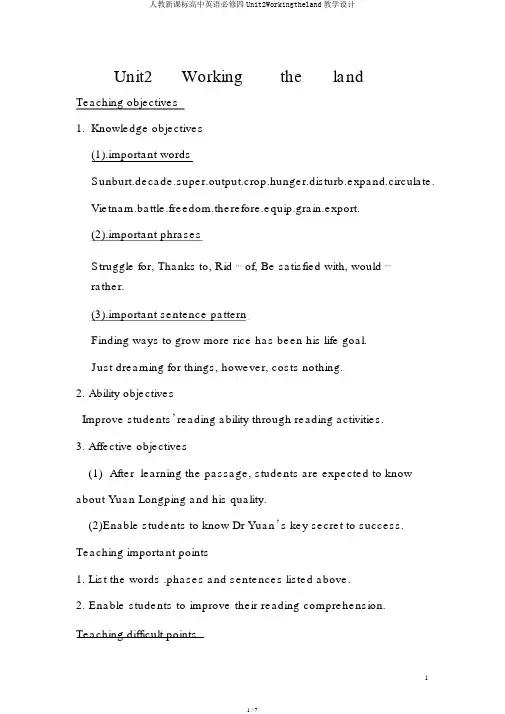
Unit2Working the landTeaching objectives1.Knowledge objectives(1).important wordsSunburt.decade.super.output.crop.hunger.disturb.expand.circulate.Vietnam.battle.freedom.therefore.equip.grain.export.(2).important phrasesStruggle for, Thanks to, Rid ⋯ of, Be satisfied with, would ⋯rather.(3).important sentence patternFinding ways to grow more rice has been his life goal.Just dreaming for things, however, costs nothing.2. Ability objectivesImprove students’reading ability through reading activities.3.Affective objectives(1)After learning the passage, students are expected to know about Yuan Longping and his quality.(2)Enable students to know Dr Yuan’s key secret to success. Teaching important points1.List the words .phases and sentences listed above.2.Enable students to improve their reading comprehension. Teaching difficult points1. Understand the following sentence correctly.Finding ways to grow more rice has been his life goal.Just dreaming for things, however, costs nothing.2.How to help students understand the passage better.Teaching proceduresStep1 Leading in (3 minutes)教师活动:表现一幅农民在田里劳作和一幅田地的图片让学生们观察。
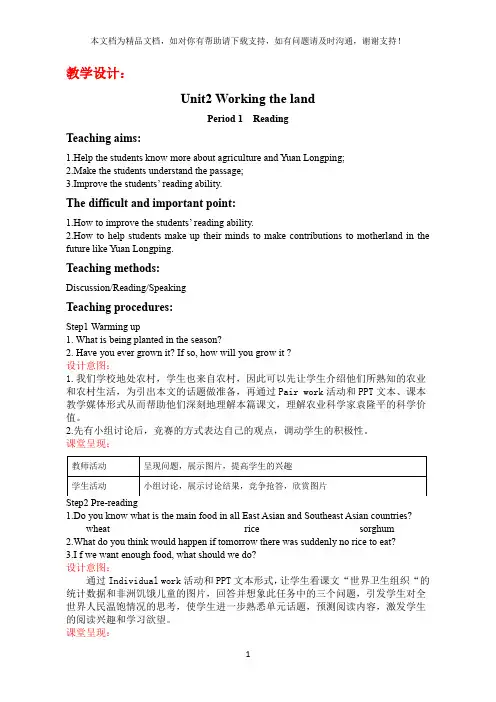
教学设计:Unit2 Working the landPeriod 1 ReadingTeaching aims:1.Help the students know more about agriculture and Yuan Longping;2.Make the students understand the passage;3.Improve the students’ reading ability.The difficult and important point:1.How to improve the students’ reading ability.2.How to help students make up their minds to make contributions to motherland in the future like Yuan Longping.Teaching methods:Discussion/Reading/SpeakingTeaching procedures:Step1 Warming up1. What is being planted in the season?2. Have you ever grown it? If so, how will you grow it ?设计意图:1.我们学校地处农村,学生也来自农村,因此可以先让学生介绍他们所熟知的农业和农村生活,为引出本文的话题做准备,再通过Pair work活动和PPT文本、课本教学媒体形式从而帮助他们深刻地理解本篇课文,理解农业科学家袁隆平的科学价值。
2.先有小组讨论后,竞赛的方式表达自己的观点,调动学生的积极性。
课堂呈现:教师活动呈现问题,展示图片,提高学生的兴趣学生活动小组讨论,展示讨论结果,竞争抢答,欣赏图片Step2 Pre-reading1.Do you know what is the main food in all East Asian and Southeast Asian countries?wheat rice sorghum2.What do you think would happen if tomorrow there was suddenly no rice to eat?3.I f we want enough food, what should we do?设计意图:通过Individual work活动和PPT文本形式,让学生看课文“世界卫生组织“的统计数据和非洲饥饿儿童的图片,回答并想象此任务中的三个问题,引发学生对全世界人民温饱情况的思考,使学生进一步熟悉单元话题,预测阅读内容,激发学生的阅读兴趣和学习欲望。
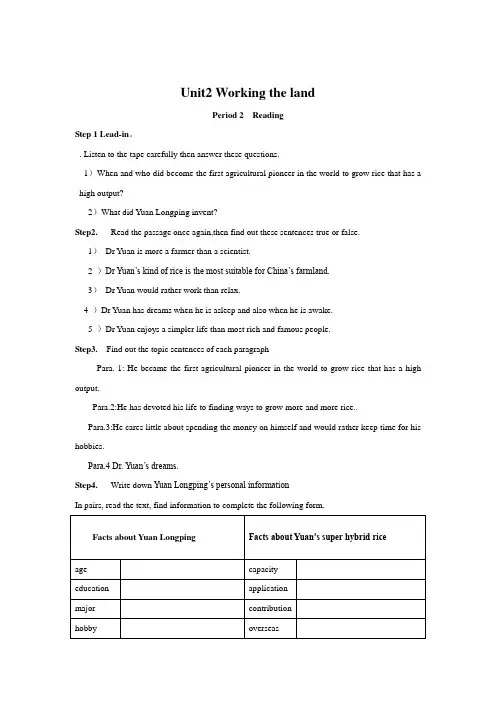
Unit2 Working the landPeriod 2 ReadingStep 1 Lead-in。
. Listen to the tape carefully then answer these questions.1)When and who did become the first agricultural pioneer in the world to grow rice that has a high output?2)What did Yuan Longping invent?Step2. Read the passage once again,then find out these sentences true or false.1)Dr Yuan is more a farmer than a scientist.2 )Dr Yuan’s kind of rice is the most suitable for China’s farmland.3)Dr Yuan would rather work than relax.4 )Dr Yuan has dreams when he is asleep and also when he is awake.5 )Dr Yuan enjoys a simpler life than most rich and famous people.Step3. Find out the topic sentences of each paragraphPara. 1: He became the first agricultural pioneer in the world to grow rice that has a high output.Para.2:He has devoted his life to finding ways to grow more and more rice..Para.3:He cares little about spending the money on himself and would rather keep time for his hobbies.Para.4 Dr. Yuan’s dreams.Step4. Write down Yuan Longping’s personal informationIn pairs, read the text, find information to complete the following form.Step 5 Language points:1. Struggle for…为争取……而斗争Struggle against…为反对……而斗争Struggle with… 与……争斗1)The swimmer struggled against the tide.2)We had to struggle with/against all kinds of difficulties.3)The slaves struggled for the freedom2. 使做…成为… make +it +adj./n. +to do好天气使游泳成为可能The fine weather makes it possible( for us )to swim.他将每早跑步做为一个规则He makes it a rule to run every morning.其他可用这种结构的词:feel, find, think, consider…3.搜查,搜索search (sb. / sth.) for …He searched all the rooms for the missing person.They searched the man all over for money.4.由于,多亏thanks to 相当于because of5.是从前两倍那么多twice as large as before相当于once larger than before6.对……感到满意be satisfied with…相当于be pleased withadj. satisfactory/satisfyingn. satisfaction7.在乎,在意care about比较care forMy aunt cared for me when my parents were away last week.Dr Yuan never cares about money and fame.8. Indeed, his sunburnt face and arms and his slim, strong body are like those of millions of otherChinese farmers.e.g: The streets in Beijing are wider than those in my hometown.The number of students in our school is larger than that in their school.9. Dr Yuan grows what is called super hybrid rice.e.g: He came to what is called America.10. This special strain of rice makes it possible to produce one -third more of the crop in the same fields.e.g: That made it possible for life to begin to develop.The development of science makes it possible for us to know more about the universe.11. Dr Yuan awoke from his dream with the hope of producing a kind of rice (that could feed more people).e.g: He went to the U.S with the hope of finding a better job there.Step 6Closing down by having a dictationTo end the period you will take a d ictation. It is about Yuan Longping, “Father of Super hybrid rice”.Yuan Longping, China's Most Famous "Farmer"Yuan came up with the idea of hybridizing rice for the first time in the world in 1960s. Since then, 50 percent of China's total rice cultivation fields have grown such rice, which added some 300 billion kilograms to the country's grain output. Furrows grown on his sunburnt face, a slim figure and coiled-up trousers legs would confuse foreign reporters who came to interview the most famous scie ntist in China, who would rather be called “a farmer”. Indeed, like many Chinese farmers, Yuan in his 70s and has devoted most of his life growing rice in paddy fields, but unlike those farmers, he reaps the seed from experimental fields only for hybridizing rice.。
Time : May 27,2016(第三节10:10-10:55)Place; Class 1 Grade 1(崇德楼一楼)Teacher: Dang LianxiaUnit 2 Working the landA pioneer for all people(Reading and Writing )Teaching goals 教学目标knowledge goals知识目标1.let students grasp these phrases :graduate from ,win thefirst prize, be admitted into a key university, go abroadfor further studies ;gain /win/be awarded the firstprize/place ;2.speak / think highly of…;be honored as…make great contributions toAbility goals 能力目标1.Help students learn how to describe Dr Yuan Longping including his personality.2.The students can use words and phrases to make sentence3.The students can use simple words to introduce Yuan Longping4. Help Ss learn how to enlarge the words and structures of the same topicEmotional objectives情感目标1.to make Ss know the contribution of Dr Yuan,2. learn his spirit and his simple life time.Teaching important and difficult points 教学重难点1. How to grasp the main idea of the passage.2. How to grasp the words and phrases and be able to use them freely.3.how to let the students learn to write simple sentences and complex sentencesTeaching methods 教学方法1.Show questions, read fast, Reading and WritingTeaching aids 教学工具blackboard, computer.Teaching procedures 教学过程Step 1.GreetingStep2.RevisionName:__________________ Nationality:____________Date of birth:_______________ Occupation:_______________ Education:________________________________________________ Dream:____________________________________________________ Achievements:________________________________________;____ ____________________________________;_____________________ Hobbies:_________________________________;____________________________________________;_____________________________ Step 3.Writing1.袁隆平, 1930年9月7日出生在重庆的一个贫困农民家庭。
Unit 2 Working the land语法课一、教学内容 Discovering useful structures (p.13); Using structures (p. 50)二、教学目标1. 学生能够识别动词-ing 形式在句子中作主语或宾语,并能够使用这种结构。
2. 学生能够区分某些常用动词后面跟不定式作宾语还是动词-ing 形式作宾语。
三、教学步骤步骤一 热身给学生呈现几幅有趣的公示牌,提醒学生注意其中使用的-ing 形式。
设计意图:从日常生活中的现象入手,一方面激起学生学习语言知识的兴趣,另一方面告诉学生这种语言知识在实际生活中的应用。
步骤二 发现与探究1. 让学生在课文里划出带有动词-ing 形式的句子。
可以先呈现给学生一个例子。
2. 小组活动。
让学生从这些句子中,找出动词-ing 形式短语作主语和宾语的句子,分成两大类。
设计意图:培养学生的探究和归纳能力。
步骤三 动词-ing 形式作主语I. Warming UpHave you ever seen these signs?Parking, spitting, littering, smoking-ing formsII. Discovering1.Find and underline the sentences in thepassage that use –ing forms.Example:Since then, finding ways to grow more rice has been his life goal. (paragraph 2)Discovering2. Choose the sentences that use –ing forms either as the subject or the object.As the subject Since then, finding ways to grow more rice has been his life goal.As the object1. 先让学生集中精力观察动词-ing 形式短语作主语的句子,看看能否发现动词-ing 形式的特点。
高一英语人教版必修4Unit2Workingtheland教案Unit2 Working the land- Warming Up, Pre-reading andReading教案1.A sample lesson plan for reading(Working the land)AimsTo help students develop their reading ability.To help students learn about working the land.ProceduresI. Warming upWarming up by questioningHello, everyone. We shall read about man who works the land today. Have you ever grown any plants? If not, what kind of plant would you like to grow? How will you grow it?(For reference: Mr. Li, I worked with my father in the rice field last year. We grow hybrid rice and use animal wastes to make the soil rich.)Has anyone of you ever been to the countryside? What did you do there?(For reference: I went to Chuankou the day before yesterday. It is a small mountain village 75 li north of Beiji ng. I went there to visit my uncle’s family. I like that small beautiful village very much. )Who are from a farmer’s family? What do you know about farming?(For reference: Mr. Li, Dou Jun and I are from a farmer’s family in our class. We grow wheat and raise pigs on our farms. And both of our family are going to expand the area of fields this year. ) Warming up seeing and listeningBoys and girls, I shall show you some photos of farming first. Look at this one. What are these ppeople doing in the fields? Yes, it is spring and they are planting rice. Lots of people in the world live on rice. I think you like eating rice, too.Planting riceHere is another photo about farming. The man driving the tractor in the photo is plowing the land to prepare for the planting. He does not grow rice there. What kind of crop is he going to plant here?Plowing the landThis photo is interesting. The woman farmer from Tibet is harvesting her crops not in the open field but in a plastic house. For generations, the people in Tibet Autonomous Region, have farmed the land using traditional methods. But in recent years, things have begun to change. All the farmers admitt the new ways are better.Indoor harvestingII. Pre-reading1. Questioning and answeringRice is main food in South China. What do you think would happen if tomorrow there was suddenly no rice to eat?(For reference: Then the south people would have to change their eating habit. They could turn to potatoes, wheat flour, cow and sheep cheese, cabbage, onions and garlic for food. They are the bases of the traditional food in North China. )If you had the chance to do one thing to help end hunger in the world, what would you do? (For reference: I would try to end hunger by popularizing the advanced farming techniques. Modern techniques could be introduced to increase the rice output, and expand the area of fields.)2. Giving background information about Professor Yuan LongpingHave you ever heard of a man called Professor Yuan Longping? Would anyone of you tell the class something about him?(For reference: Professor Yuan Longping is a Chinese agricultural scientist. Professor Yuan's breakthrough scientific achievement led to the world's first successful and widely grown hybrid rice varieties, revolutionizing rice cultivation in China and tripling production over a generation.His approach to rice breeding then spread internationally throughout Asia and to Africa and the Americas, providing food for tens of millions and leading to his becoming known as the "Father of Hybrid Rice."III. Reading1. Reading aloud to the recordingComprehension—understanding what you are reading—is important. T o read in thought groups is an easy, yet effective, way of improving reading comprehension. Now turn to page 9 and read aloud to the recording of the text A PIONEER FOR ALL PEOPLE. Pay attention to the thought groups in the sentences while listening and reading aloud.2. Reading and underliningRead the text again and underline all the collocations in the passage. You are asked to copy them to your notebook after class as homework.Collocations from A PIONEER FRO ALL PEOPLEcall sb. …, regard sb. …, work the land, do one’s research, for the past five decades, grow hybrid rice, become an agricultural pioneer, have a high output, produce one-third moreof the crop, be born into a poor family, graduate from a college, devote one’s life to…, find ways to do sth., see the great n eed for doing sth., increase the rice output, search for a way to do sth., increase rice harvests, expand the area of fields, produce tons of rice, feed sb. from a piece of farmland, circulate one’s knowledge, thanks to…, rid the world of hunger, be satisf ied with…, care little about…, spend money on…, lead a comfortable life, have troubles, equip sb. for sth., care about…, keep one’s time for…, play one’s violin, play mah-jong, ride one’s motorcycle, wish for…, in a dream, an ear of rice, a grain of rice, awake from one’s dream3. Reading, identifying and summarizingAttention, please! It is time to skim the text one more time and identify the topic sentence of each paragraph.(Minutes later) Xue Hongmei, would you read to the class the four topic sentences you identified? What about the main idea of the passage? Who will volunteer to give the class his summary of the main idea? Bai Jianfang, you’d like to say something? Go ahead!4. Understanding difficult sentencesIn groups of four, analyze the structure of the difficult sentences. If you have any problems which are too difficult for you to solve do not hesitate to put them to me.5. Reading and transferringIn pairs, read the text, find information to complete the following form.Facts about Yuan Longping Facts about Yuan’s super hybrid riceage capacityeducation applicationmajor contributionhobby overseasideal futureIV. Closing downClosing down by doing exercisesIn the last five minutes let’s do the comprehension exercises on page 10. Check your answers against your neighbour’s when you have finished.Closing down by having a dictationTo end the period you will take a dictation. It is about Yuan Longping, “Father of Super hybrid rice”.Yuan Longping, China's Most Famous "Farmer"Yuan came up with the idea of hybridizing rice for the first time in the world in 1960s.Since then, 50 percent of China's total rice cultivation fields have grown such rice,which added some 300 billion kilograms to the country's grain output. Furrows grown on his sunburnt face, a slim figure and coiled-up trousers legs would confuse foreign reporters who came to interview the most famousscientist in China, who would rather be called "a farmer." Indeed, like many Chinese farmers, Yuan in his 70s and has devoted most of his life growing rice in paddyfields,but unlike those farmers, he reaps the seed from experimental fields onlyfor hybridizing rice.。
人教版高中英语必修4《Unit 2 Working the land》教案人教版高中英语必修4《Unit 2 Working the land》教案【一】教学准备教学目标(1)知识目标:让学生通过阅读课文更多地了解我国著名的农业科学家袁隆平的科研成果及其影响。
(2)能力目标:让学生进一步使用恰当地阅读方式与技能,如略读(skimming),快速阅读(fast reading),细读(close reading)等(3)情感目标:让学生不但学习袁隆平的科研精神,更要学习他不计较名利,踏踏实实的生活态度。
教学重难点1.阅读课文更多地了解我国著名的农业科学家袁隆平的科研成果及其影响。
教学过程1. 话题的引导。
(Pre-reading)1).开头通过设计了一首熟悉的诗歌,让学生知道话题---farming.2).涉及到提高产量从而解决世界饥荒问题,从而引出本节课的中心话题--伟大人物袁隆平。
2. 跟读与限时阅读完成导学案练习贯彻目的与困难策略,指导学生根据不同的阅读目的,在阅读的不同阶段,灵活使用各种阅读策略,捕捉文章主要信息,理解作者的写作意图,突破本文的教学重点与难点。
采用整体语言教学法和任务型语言教学法。
1)、通过限时阅读训练,引导学生如何利用略读(skimming)的方法把握文章的大意,侧重培养快速阅读理解能力和文章中心把握能力。
2)、精读各个段落语段,侧重培养快速捕捉文章重要细节的能力和猜测生词的能力,学会欣赏文章中的优美句子。
3:阅读过程--浅层次阅读。
(Reading I)1). 其中关于人物的基本信息中,通过设计了一个信息表格的浅层次阅读练习,对文中人物有了初步了解。
2). 关于他的梦想,书本上描写得非常生动,我让班里有艺术特长的学生画了一幅漫画,利用画面反映课文第四段所描述的内容,同时用第一人称配了声音效果。
4. 阅读过程--深层次阅读。
(Reading II)在处理了一些简单信息之后,阅读人物最重要的是要读出人物不同于其他人的成就以及值得学生学习的一些可贵品质。
I. 教材分析本单元的中心话题是“农业",学生通过讨论和阅读了解有关农业、农村和农作物种植的内容。
让学生了解农业在整个人类生活中的重要性,了解农村生活,了解中国农民的生活现状,提高他们对农业的认识,并且帮助他们更深刻地理解农业科学家袁降平的科学研究的价值。
培养学生从小养成爱惜粮食,不铺张浪费的好习惯。
同时让学生了解organic farming以及它对人们生活的重要性,进一步扩大学生的关于农业方而的词汇量,并通过写一则海报提高学生的写作水平。
1WARMING-UP通过提问有关农业、农村和农作物种植的内容,让学生谈谈自己対农村和农业劳动的认识或经验。
教师可通过讨论让学生互相学习,相互交流经验以增加他们的农业知识。
2PRE-READING部分有两组问题。
在第一组问题中,讨论大米在东亚和东南亚国家人民生活中的重要性;而第二组问题则提出世界部分地区所面临的饥饿问题。
由此激发学生对世界的关注,培养学生的同情心。
3READING部分介绍中国著名的农业科学家袁降平的生平和他的杂交水稻。
第一段描述了袁博士的外表一一他更象一个农民而不象一个科学家,农村就是他做科研的殿堂。
他的科研成果就是超级杂交水稻。
第二段描述他的家庭出身,学业,献身水稻科研的原因及所取得的成就。
第三段告诉我们袁博士过着跟普通人一样的生活却干着伟大的事业。
即使在功成名就之后,他也淡泊名利,有着无私奉献的高尚精神。
4COMPREHENDING部分设计了三个练习。
第一个是判断练习,学生根据课文中理解和收集的信息做出判断,其至通过讨论才能做出判断。
第二个是词语理解题。
第三个练习提出问题,要求学生在阅读课文后作出冋答,以检验他们的理解力和训练他们的归纳总结能力。
5LEARNING ABOUT LANGUAGE部分学习本单元重点词汇和语法项目。
词语学习部分采用给出词义而让学生从课文中找出与之匹配的词,然后用所找的词汇完成笫二个练习中的短文,以及用课文中意义相近的词汇替换练习三句中划线部分。
目录一、教学理念 (1)二、设计思路 (1)三、教材分析 (2)四、学情分析 (2)五、教学目标 (3)(一)语言知识 (3)(二)学习能力 (3)(三)情感态度 (3)六、教学重难点 (3)(一)教学重点 (3)(二)教学难点 (3)七、教学方法 (3)八、教学环节 (4)Step 1: Lead in (4)Step 2: Reading (5)Step 3: Discussion and Presentation (6)Step 4: Micro-writing: summary (7)Step 5: Homework (9)九、板书设计 (9)十、预设反思 (9)一、教学理念为了落实“立德树人”的根本任务,发展素质教育,教育部制定并颁布了《普通高中英语课程标准(2017年版)》(以下简称《课标》)。
《课标》指出普通高中英语课程具有重要的育人功能,把英语学科的工具性和人文性统一起来,旨在发展学生的语言能力、文化意识、思维品质和学习能力等英语学科核心素养。
其中文化意识指对中外文化的理解和对优秀文化的认同,是学生在全球化背景下表现出的跨文化认知、态度和行为取向。
在落实方面,明确教师在发展学生英语语言能力的过程中,应帮助他们学习、理解和鉴赏中外优秀文化,培育中国情怀,坚定文化自信,拓宽国际视野,增进国际理解(教育部,2018)。
在英语学科教育的过程中,丰富学生的文化知识、增加学生的情感体验、端正学生的文化态度、形成学生正确的价值判断、内化学生的文化品格、优化学生的文化行为是培养学生文化意识的重要内容(章策文,2019)。
针对母语文化和目的语文化的相互关系和在教学中的侧重,梅德明教授(2018)提出,在外语学科教育中,国际视野和跨文化沟通能力应该以中国情怀和中华基因为根基。
外语教育必须培养学生的“中国情怀”“国际视野”“文化意识”“思维品质”“人文素养”和“沟通能力”,要求学生树立正确的历史观、国家观、民族观、文化观,理解中国特色社会主义文化,主动积极地与来自多元文化背景的人们共同构建人类命运共同体。
Unit2Working the landTeaching objectives1.Knowledge objectives(1).important wordsSunburt.decade.super.output.crop.hunger.disturb.expand.circulate.Vietnam.battle.freedom.therefore.equip.grain.export.(2).important phrasesStruggle for, Thanks to, Rid…of, Be satisfied with,would… rather.(3).important sentence patternFinding ways to grow more rice has been his life goal.Just dreaming for things, however, costs nothing.2. Ability objectivesImprove students’ reading ability through reading activities.3. Affective objectives(1) After learning the passage, students are expected to know about Yuan Longping and his quality.(2)Enable students to know Dr Yuan’s key secret to success. Teaching important points1. List the words .phases and sentences listed above.2. Enable students to improve their reading comprehension. Teaching difficult points1.Understand the following sentence correctly.Finding ways to grow more rice has been his life goal.Just dreaming for things, however, costs nothing.2. How to help students understand the passage better.Teaching proceduresStep1 Leading in (3 minutes)教师活动:呈现一幅农民在田里劳作和一幅田地的图片让学生们观察。
Ask students some questions after representing two pictures.1. Please describe what you have seen in the picture.2. Have you ever experienced something like that? If so, tell us the experience about it; If not, would you like to try growing? And why? 学生活动:Describe what you see in the picture and recall what you have experienced.设计目的:激活学生的学习兴趣,让学生积极、主动参与。
Step 2 pre-reading (3 minutes)I am so surprised that all of you are interested in working the land. As we all know, food and grain are essential for all people to survive. And working on land is also a necessary approach. Grains, like wheat, rice, are planted on the land. Besides, it’s reported that rice is the main food in all East Asian and Southeast Asian countries. Whatdo you think would happen if tomorrow there was suddenly no riceto eat?Now that everyone has realized the importance of food, I can’t help knowing who get us out of the hunger. We all must appreciate it. Today, we come to the reading –A PIONNER FOR ALL PEOPLE. Let’s have access to him. Please read the article fastly.教师活动:老师问学生What do you think would happen if tomorrow there was suddenly no rice to eat?并呈现资料:According to the world, Health Organization(WHO):The world produces enough food for everyone.More than 800 million people go to bed hungry everyday.学生活动:学生分组把自己的想法汇报给组员,组员之间相互交流,并做好在班级学生面前发言的准备。
设计意图:(1)激活学生已有的信息,使学生具备摄入新知识的心理定势。
(2)激发学生的学习兴趣。
(3)帮助老师引入课文的主题。
Step 3 while-reading(14 minutes)1.fast reading (4 minutes)(Before you read the article ,I will ask you to answer the question presented on the PPT.)Ask the students to read the passage quickly and match theparagraphs with the main ideas.教师活动:教师用投影仪展示出下列问题:Paragraph 1 Dr Yuan’s attitude towards life.Paragraphs 2 The quality of Dr YuanParagraphs 3 The process to grow more rice and its magnificence. Paragraphs 4 A general introduce to Yuan Long ping.学生活动:学生快速浏览课文,了解课文大意。
设计意图:训练学生快速阅读,归纳各段落的中心意思的能力。
(skimming for the main idea )2. Careful reading (10 minutes)(1) 教师活动:要求学生认真阅读课文,寻找相关信息:①What is the super hybrid?②Why does Dr Yuan want to grow more rice?③Get the students to read the text and decide whether the following statements are true(T) or false(F).a. He has struggled for the past fifty years ( )b. Now not less than 60% of the price produced in Chinaeach year is from this hybrid strain. ( )c. Dr Yuan searched for a way to increase rice harvestswith expending the area of the fields. ( )d. Thanks to his research, the UN d oesn’t have more tools in the battle to rid the world of hunger. ( )e. However, he cares about being famous. ( )学生活动:认真阅读课文完成任务,然后向全班学生汇报。
设计意图:训练学生快速查读细节、捕捉信息的能力。
(scanning for detailed information )(2)教师活动:用多媒体展示表格学生活动:填写表格Name: Nationality:Age: Occupation:Education:Dream:Achievement:Hobbies:设计意图:1.让学生进一步了解和认识袁隆平。
2.梳理文章的脉络和大意。
Step 4 Post-reading (6 minutes)教师活动:教师展示一些具有归纳总结性的问题:①Tell us what the article is mainly about, in your own words.②Dr Yuan was able to develop a successful agricultural product when thousands of other farmers could not. What do you think is the main reason for his success?③Dr Yuan developed super hybrid rice to help Chinese farmers andhungry people around the world. Can you think of any other major development that makes a great difference to world hunger?学生活动:学生思考并讨论上述问题,然后向全班同学汇报。
设计意图:①帮助学生进行课堂反思,自己学到了些什么知识;②拓展学生的视野,致力于实际问题的解决。